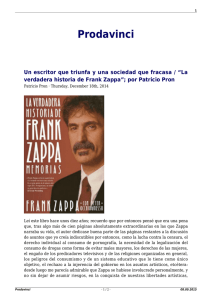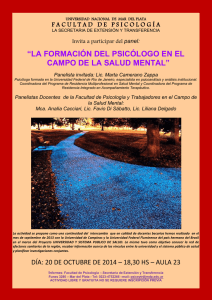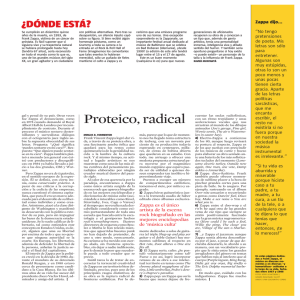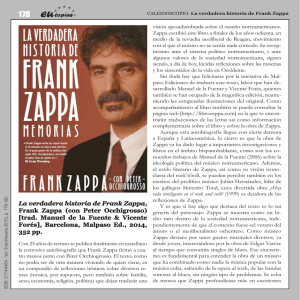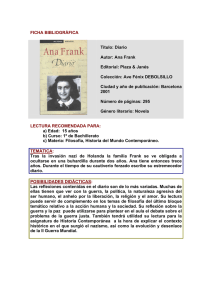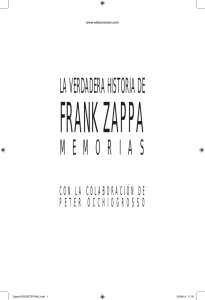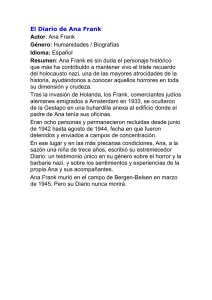Frank Zappa
Anuncio
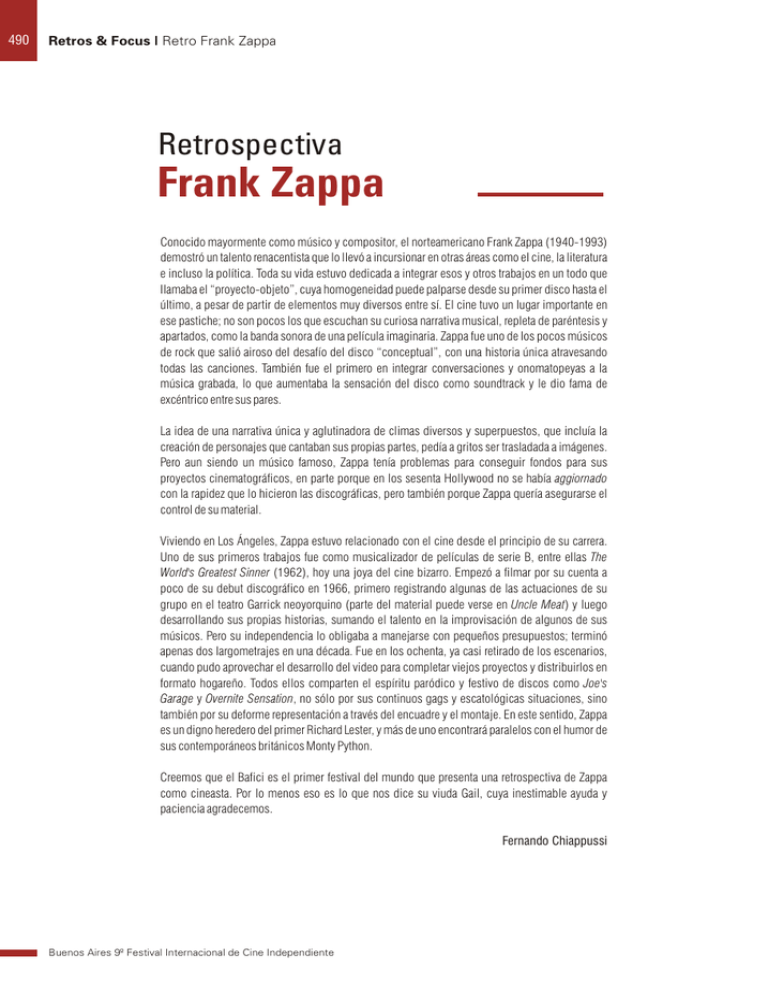
125 490 Retros & Focus | Retro Frank Zappa Retrospectiva Frank Zappa Conocido mayormente como músico y compositor, el norteamericano Frank Zappa (1940-1993) demostró un talento renacentista que lo llevó a incursionar en otras áreas como el cine, la literatura e incluso la política. Toda su vida estuvo dedicada a integrar esos y otros trabajos en un todo que llamaba el “proyecto-objeto”, cuya homogeneidad puede palparse desde su primer disco hasta el último, a pesar de partir de elementos muy diversos entre sí. El cine tuvo un lugar importante en ese pastiche; no son pocos los que escuchan su curiosa narrativa musical, repleta de paréntesis y apartados, como la banda sonora de una película imaginaria. Zappa fue uno de los pocos músicos de rock que salió airoso del desafío del disco “conceptual”, con una historia única atravesando todas las canciones. También fue el primero en integrar conversaciones y onomatopeyas a la música grabada, lo que aumentaba la sensación del disco como soundtrack y le dio fama de excéntrico entre sus pares. La idea de una narrativa única y aglutinadora de climas diversos y superpuestos, que incluía la creación de personajes que cantaban sus propias partes, pedía a gritos ser trasladada a imágenes. Pero aun siendo un músico famoso, Zappa tenía problemas para conseguir fondos para sus proyectos cinematográficos, en parte porque en los sesenta Hollywood no se había aggiornado con la rapidez que lo hicieron las discográficas, pero también porque Zappa quería asegurarse el control de su material. Viviendo en Los Ángeles, Zappa estuvo relacionado con el cine desde el principio de su carrera. Uno de sus primeros trabajos fue como musicalizador de películas de serie B, entre ellas The World's Greatest Sinner (1962), hoy una joya del cine bizarro. Empezó a filmar por su cuenta a poco de su debut discográfico en 1966, primero registrando algunas de las actuaciones de su grupo en el teatro Garrick neoyorquino (parte del material puede verse en Uncle Meat) y luego desarrollando sus propias historias, sumando el talento en la improvisación de algunos de sus músicos. Pero su independencia lo obligaba a manejarse con pequeños presupuestos; terminó apenas dos largometrajes en una década. Fue en los ochenta, ya casi retirado de los escenarios, cuando pudo aprovechar el desarrollo del video para completar viejos proyectos y distribuirlos en formato hogareño. Todos ellos comparten el espíritu paródico y festivo de discos como Joe's Garage y Overnite Sensation, no sólo por sus continuos gags y escatológicas situaciones, sino también por su deforme representación a través del encuadre y el montaje. En este sentido, Zappa es un digno heredero del primer Richard Lester, y más de uno encontrará paralelos con el humor de sus contemporáneos británicos Monty Python. Creemos que el Bafici es el primer festival del mundo que presenta una retrospectiva de Zappa como cineasta. Por lo menos eso es lo que nos dice su viuda Gail, cuya inestimable ayuda y paciencia agradecemos. Fernando Chiappussi Buenos Aires 9º Festival Internacional de Cine Independiente Retros y Focos | Foco Retro Frank Zappa Best-known as musician and songwriter, American Frank Zappa (1940-1993) exhibited a Renaissance talent that led him to experiment in other areas, such as filmmaking, literature, and even politics. His whole life was dedicated to integrating his multiple works in a whole he called the “project-object”, whose consistency can be perceived from his first record to the last, despite they all start from very diverse elements. Filmmaking had a privileged place in that pastiche; not few people listen to his weird musical narrative, filled with parentheses and asides, like the soundtrack of an imaginary film. Zappa was one of the few rock musicians who came out of the challenge of the “conceptual” album with flying colors. He was also the first to blend chats and onomatopoeias into recorded music, which heightened the feeling of album-as-soundtrack and earned him a crackpot reputation among his colleagues. The notion of a single narration bringing together different, overlapping moods, including the creation of characters who would sing their own parts, was screaming out to be put into pictures. However, Zappa had a hard time of it to finance his film projects, regardless of him being a famous musician, partly because in the '60s Hollywood had not caught up with the zeitgeist as fast as record companies had, but also because Zappa wanted complete control over his material. Living in Los Angeles, Zappa had connections with filmmaking from the very beginning of his career. One of his first jobs was to compose music for B-movies, such as The World's Greatest Sinner (1962), considered today a gem of bizarre film. He began shooting on his own shortly after his record debut in 1966, first recording some of his band's performances at New York's Garrick Theater (part of that material can be seen in Uncle Meat), then developing his own plots, throwing in of some of his musicians' talent for improvisation. His independence forced him to work on a shoestring; he just completed two features in a decade. It was in the '80s, when he was practically retired, that he could profit from video, finishing old projects and distributing them in home format. All of them share in the parodic, festive spirit of albums like Joe's Garage and Overnite Sensation, not only for its continuous gags and scatology, but also for its deformed representation through framing and editing. In this aspect, Zappa is a fine follower of the first Richard Lester, and many will find parallels with the humor of his British contemporaries, Monty Python. We believe that Bafici is the first festival worldwide to feature a retrospective of Zappa the filmmaker. Al least, that is what we are told by Gail, his widow, whose invaluable help and patience we are grateful for. FC Buenos Aires 9º Festival Internacional de Cine Independiente 5491 21 125 492 Retros & Focus | Retro Frank Zappa Estados Unidos - US, 1971 98' / 16 mm / Color D: Frank Zappa, Tony Palmer, Charles Swenson G, M: Frank Zappa F: Tony Palmer DA: Carl Schenkel E: Rich Harrison P: Herb Cohen, Jerry D. Good CP: Bizarre Productions - Murakami-Wolff Productions I: Theodore Bikel, Mark Volman, Howard Kaylan, Ian Underwood, Aynsley Dunbar, George Duke, Keith Moon, Ringo Starr, Frank Zappa Contacto / Contact Intercontinental Absurdities, Ltd. 11684 Ventura Boulevard, Suite 802 91604 Studio City, CA, USA T +1 818 755 3700 F +1 818 761 7773 Copia / Print Filmoteca Buenos Aires E filmotecaba@fibertel.com.ar 200 Motels (200 moteles) Los Mothers of Invention llegan a la ciudad de Centerville, otra escala de una larga e interminable gira donde cada etapa es igual a la siguiente: hotel, concierto, búsqueda de groupies y discusiones internas en la banda (cuyo dictatorial líder es interpretado por Ringo Starr). Absurda y ocurrente, 200 Motels es una mezcla de musical, ópera-rock y sitcom que transmite con fidelidad el estado catatónico de cualquier banda en la ruta. Incluye el segmento “El dilema de la higiene dental”, animado por Chuck Swenson. The Mothers of Invention arrive in Centerville, another stopover in an endlessly long tour where every stage is the same as the next: hotel, concert, search for groupies and arguments within the band (whose dictatorial leader is played by Ringo Starr). Absurd and witty, 200 Motels is a mixture of musical, opera-rock and sitcom truthfully conveying the catatonic state of any rock band on the road. Includes “The Dental Hygiene Dilemma” segment, animated by Chuck Swenson. Buenos Aires 9º Festival Internacional de Cine Independiente Retros y Focos | Retro Frank Zappa Estados Unidos - US, 1977 166' / Betacam / Color D: Frank Zappa ANIM: Bruce Bickford P: Frank Zappa, Bennett Glotzer Contacto / Contact Intercontinental Absurdities, Ltd. 11684 Ventura Boulevard, Suite 802 91604 Studio City, CA, USA T +1 818 755 3700 F +1 818 761 7773 Baby Snakes (Víboras bebé) Una de las tradiciones de Zappa era dar un concierto especial en Halloween. En 1977, el evento tuvo lugar en Nueva York y con una de sus mejores bandas: entre los músicos están Terry Bozzio, Peter Wolf y un jovencísimo Adrian Belew. Baby Snakes reproduce buena parte del concierto –el Zappa guitarrista puede apreciarse aquí como en ninguna otra parte–, además de bizarras entrevistas de backstage, incluida una al animador Bruce Bickford “explicando” algunas de sus creaciones. La película se estrenó en una sola sala neoyorquina en 1979, donde se mantuvo durante meses a teatro lleno. A tradition of Zappa was giving a special gig on Halloween. In 1977, the event took place in New York with one of his best bands: there was Terry Bozzio, Peter Wolf and a young Adrian Belew. Baby snakes reproduces most of the concert –Zappa the guitar player can be best appreciated here than anywhere–, apart from bizarre backstage interviews, including one with animator Bruce Bickford “explaining” some of his creations. The film opened at one single New York theater in 1979, and it was so successful that stayed on for months. Buenos Aires 9º Festival Internacional de Cine Independiente 5493 21 125 494 Retros & Focus | Retro Frank Zappa Estados Unidos - US, 1989 60' / Betacam / Color D: Frank Zappa, Bruce Bickford G, P: Frank Zappa Contacto / Contact Intercontinental Absurdities, Ltd. 11684 Ventura Boulevard, Suite 802 91604 Studio City, CA, USA T +1 818 755 3700 F +1 818 761 7773 The Amazing Mr. Bickford (El sorprendente Sr. Bickford) Zappa siempre estuvo interesado por el cómic y la animación, y colaboró con varios artistas de ese campo en la parte visual de sus discos y conciertos. El más conocido de ellos es Bruce Bickford, con quien alguna vez planeó hacer una película. La “dispersión” del propio Bickford (ver Baby Snakes) hizo imposible concluir el proyecto, pero Zappa compiló algunas escenas terminadas en este mediometraje. El laberíntico y surrealista mundo de Bickford –quien vive y sigue trabajando en un sótano de Seattle– explota en estas imágenes de pesadilla, conseguidas pacientemente con plastilina y la técnica del stop-motion. Zappa has always been interested in comic and animation, collaborating on the visuals of his albums and concerts with various artists. Among them, the best-known is Bruce Bickford, with whom Frank planned at some point to make a movie. Bickford's own “dispersion” (see Baby Snakes) made completion impossible, but Zappa brought together some finished scenes in this medium-length feature. Bickford's maze-like, surreal world –he still lives and works in a Seattle cellar- explodes in these nightmarish images patiently elaborated with plasticine and the stop-motion technique. Buenos Aires 9º Festival Internacional de Cine Independiente Retros y Focos | Retro Frank Zappa Estados Unidos - US, 1987 100' / Betacam / Color D: Frank Zappa Contacto / Contact Intercontinental Absurdities, Ltd. 11684 Ventura Boulevard, Suite 802 91604 Studio City, CA, USA T +1 818 755 3700 F +1 818 761 7773 Uncle Meat (Tío Carne) La otra película de ficción de Frank comenzó a rodarse en 1968, en fílmico y con Haskell Wexler como cameraman. El proyecto fue abandonado y retomado unos quince años más tarde, ahora en video y con otros músicos y actores. La película original ha mutado, a tal punto que la montajista termina contagiándose de lo que ve en la moviola y se convierte en una groupie más. Porque el gran tema de Uncle Meat es el fetichismo en todas sus formas, y los músicos –con guión o improvisadamente– explican y representan sus perversiones preferidas. Hay muñecas, embutidos y el “primer implante de guitarra peneano” (sic). The shooting of Frank's other fiction film started in 1968, on film, and with Haskell Wexler at the camera. The project was abandoned and resumed some fifteen years later, now on video and with different musicians and actors. The original has mutated, so much so that the editor ends up by adopting what she sees in the editing room and becomes yet another groupie. Uncle Meat's great subject is fetishism in all its shapes and forms. Improvising or with a script, the musicians explain, and represent, their favorite perversions. There are dolls, sausages and “the first penis guitar implant” (sic). Buenos Aires 9º Festival Internacional de Cine Independiente 5495 21 125 496 Retros & Focus | Retro Frank Zappa Estados Unidos - US, 1988 59' / Betacam / Color D: Frank Zappa Contacto / Contact Intercontinental Absurdities, Ltd. 11684 Ventura Boulevard, Suite 802 91604 Studio City, CA, USA T +1 818 755 3700 F +1 818 761 7773 The True Story of Frank Zappa's 200 Motels (La verdadera historia de 200 Moteles de Frank Zappa) Utilizando escenas y ensayos descartados del montaje original, más entrevistas realizadas durante el rodaje, Zappa reconstruye la bizarra historia de la película 200 Motels, uno de los proyectos más dificultosos de su carrera. La filmación duró una semana y sólo se utilizó un tercio del guión original. El director Tony Palmer renunció pidiendo que sacaran su nombre de los créditos; la orquesta contratada para la música de apoyo boicoteaba las grabaciones y, en medio del embrollo, el propio Zappa tuvo que hacerse cargo de la dirección y el montaje. Aquí se cuenta todo el proceso sin deferencias ni eufemismos. Using takes and rehearsals discarded from the original edit plus interviews made during the shooting, Zappa reconstructs the bizarre story of 200 Motels, one of the most problematic projects in his career. The shooting lasted a week and only a third of the original script was ever used. Director Tony Palmer resigned, asking to not credit him; the orchestra hired to play the background music boycotted the recording sessions. Amid the wreckage, Zappa himself had to take over directing and editing. The whole process is retold here, no words spared or minced. Buenos Aires 9º Festival Internacional de Cine Independiente
